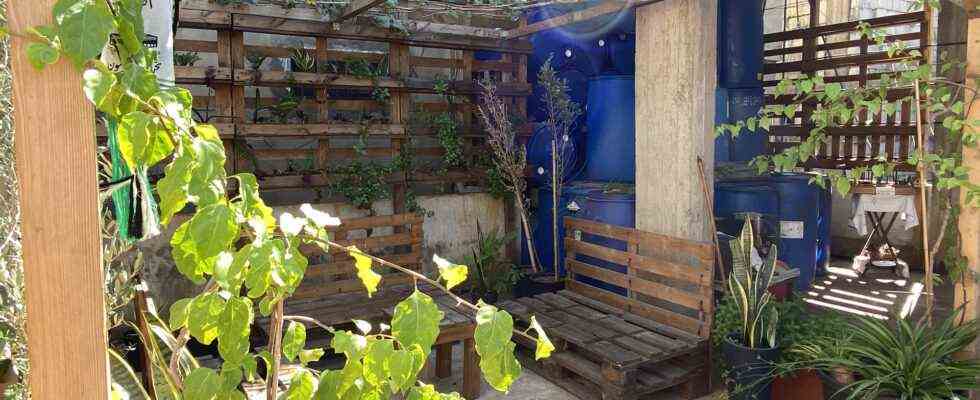Status: 07/02/2021 4:18 a.m.
The economic crisis in Lebanon is also hitting the people in the refugee camps hard. In two camps, the residents want to be self-sufficient. They plant cucumbers and tomatoes on roofs.
From Anne Allmeling,
ARD studio Cairo
Mahmoud kneels in front of a small flower bed, loosens the soil, pours zucchini and tomatoes. “I work with the seedlings that I have received. I water them and move the earth because the plants have to get air,” he says. When he sees the earth getting dry, he waters it. “The environment has to suit the plants.”
Mahmound’s garden is unusually high: on the roof of a seven-story building – in the middle of the Shattila refugee camp in the south of Beirut. When the camp was founded in 1949, it was considered a makeshift for displaced Palestinians. But today, more than 70 years later, it is bursting at the seams. Many people from Syria have also found refuge here. The paths are narrow and convoluted, the houses keep growing higher and higher.
Growing vegetables on the roofs of the Schattila refugee camp.
Lebanese pound in free fall
There are hardly any green spaces here. That should change now, says Haneen Khalid from the Palestinian organization Jafra. With financial support from Germany, including from Welthungerhilfe, she and her team help the residents of the camp to plant gardens on their roofs.
“The aim of our project is for people to learn something new. How to take care of plants and what to do with them,” she says. It is also about food safety: people should be able to provide for themselves and not have to buy everything.
In the past two years, prices in Lebanon have risen sharply. Because the country is in a serious economic and financial crisis. This is particularly noticeable in the refugee camps: many people work as day laborers, receive their wages in Lebanese pounds – and its value is falling day by day.
First harvest already taken
Even Mahmoud, who does not want to give his full name, can barely make a living from his earnings. “I have another job, but the situation in the country, the exchange rate to the dollar and the corona crisis make everything very difficult,” he says. He is doing badly – like all other people.
The 28-year-old was initially not particularly impressed by the idea of the roof gardens. But now Mahmoud spends two to three hours a day on his roof: “I give the peppermint fertilizer every now and then. And when I see that a plant is dying,
I cut a twig for her so she could still grow. “He’s taking good care of the plants.” And despite the help I get from the organization, I check YouTube for more information. ”
The plants in Mahmoud’s garden are still small. Most grow in buckets or plastic tubs. But Mahmoud has already had his first harvest behind him: “Here are the cucumber plants. One of them has already carried a cucumber, but a friend of mine ate it.”
Greenhouse and chicken coop
In the Burj El-Barajneh refugee camp, a few kilometers south, the cucumbers, tomatoes and aubergines are much larger. The Jafra organization created a model garden here with everything that goes with it: a greenhouse, a small chicken coop and an arbor.
Omar harvesting mint in the Burj El-Barajneh refugee camp
Most of it was built by Omar Ahmed Abu Zeinab. “The nicest thing here is that you are in a green place. That is the most important thing. The soul also finds peace here. The organization is very fraternal with us. Everyone helps each other.”
The Palestinian Syrian came to Lebanon eight years ago. With his help, Burj El-Barajneh has already become a little greener. “The area of the camp is very small, so there is hardly anything green in this camp,” he says. It is very tight. All the green here was made by the Jafra organization. “We now have a total of eight green roofs. This is really a nice thing, a new idea!” He always wished to see a tree. “But that didn’t exist in the past.”
Growing in the Crisis: Roof Gardens in Refugee Camps in Lebanon
Anne Allmeling, ARD Cairo, July 1, 2021 8:38 pm

